
Working PI 6353 El Cajon Blvd, Suite 124-605 San Diego, CA 92115-2600 [ Now Reaching 25,000 Private Investigators with Every Issue ] Private Investigators Spring 2023, Vol. 3
MAYOR SUES
Politics and Surveillance Intersect
INVESTIGATOR: When
or Curse?
DRONES in Your Investigations
SUBCONTRACTING: Fortune
USING

Your Job Isn’t Always Easy. Your Coverage Should Be. “Easy to work with, year after year.” —Lex Steers OREP Insurance Services, LLC. Calif. Lic. #0K99465
“I have used OREP for more than 10 years and have found them to be consistently helpful and a good value. I highly recommend them.” —Tom Jackson


“Easy to renew. Thanks!” —Larry Albertson

INSURANCE FOR PRIVATE INVESTIGATORS GENERAL LIABILITY AND E&O COVERAGE —IN ONE POLICY WE KNOW INSURANCE Over 12,000 Professionals Trust OREP with Their Insurance OVER 600+ 5 Star Reviews on Google 8 Hours Continuing Education at No Extra Charge (6 Hours in NC).
Insurance Designed Specifically for Firms like YOU • Blanket Additional Insured endorsement • Coverage for your independent contractors • Insurance Carriers Rated "Excellent" • Criminal, insurance, and clandestine investigations • Fire/Accident origin investigations
Wanted Persons investigations SPECIAL: OREP MEMBERS Enjoy 8 Hours CE Visit OREP.org/PI or Call (888) 347-5273
•
Editor’s Note
by Kendra Budd, Editor
Contributors
Subcontracting: Fortune or Curse?
 by Kelly E. Riddle, President of Kelmar Global
by Kelly E. Riddle, President of Kelmar Global
Using Drones in Your Investigations with Jay Paulino
by Isaac Peck, Publisher
What You Need to Know Before Hiring a Fire and Explosion Investigator
 by James T. Born, PI, CFI, INCI, MIAAI
by James T. Born, PI, CFI, INCI, MIAAI
Digital Investigations Can Grow Your Business

 by Amber Schroader, Paraben Corporation
by Amber Schroader, Paraben Corporation
COVER STORY: Mayor Sues Investigator: When Politics and Surveillance Intersect
by Kendra Budd, Editor
The Weinstein Saga: When Power Weaponizes Intelligence
by Tabatha Villegas
Social Media Investigations
 by Kendra Budd, Editor
by Kendra Budd, Editor
The Investigation of Missing and Exploited Children
by Joseph A. Travers, CPI, CCDI, CMECI
2 Working PI | Spring 2023
PI is published
readers build
businesses, reduce their
of liability and stay
im portant technology and industry issues. Write Us at Working PI Comments and letters are welcome. All stories without attribution are written by the editor. Serving Private Investigators 5 4 Working PI 6353 El Cajon Blvd., Suite 124-605 San Diego, CA 92115 (888) 347-5273 subscription@workingpimag.com WorkingPImag.com Spring 2023, Vol. 3 6 14 PUBLISHED BY We Know Insurance | www.OREP.org Like Us on Facebook! Facebook.com/workingpi Working PI is published by OREP Insurance Services, LLC (Calif. Lic. #0K99465) and mailed to 25,000 private investigators nationwide. The ads and specific mention of any proprietary product contained within are a service to readers and do not imply endorsement by Working PI. No claims, representations or guarantees are made or implied by their publication. The contents of this publication may not be reproduced either in whole or in part without written consent. 10 18 20 26 32 36 40 Publisher Isaac Peck | isaac@orep.org Editor Kendra Budd | kendra@orep.org Senior Graphic Designer Ariane Herwig | ariane@orep.org Graphic Design Associate Maria Cornelia | mj@orep.org 6 14 20 26 32
Professional Marketplace Mission Working
to help
their
risk
informed on

Privacy and Its Discontents
“Invasion of privacy” claims are central to a flurry of recent lawsuits that have been filed against private investigators over the last 12 months. Of course, this is nothing new for PIs.
Even when an investigator does everything they can to follow the letter of the law, their targets often look for any opportunity to fight back, get the evidence thrown out, or file a lawsuit in retaliation.
We’ve seen invasion of privacy claims from personal injury plaintiffs in multi-million (or billion!) dollar lawsuits (See “$13 Billion Investigator's Trespass and Privacy Claim,” Visit WorkingPImag.com). And in this issue, we look at a recent lawsuit filed against a PI by the Mayor of Reno, NV, alleging invasion of privacy, trespassing, doxxing, and more (among other things—See pg. 20).
In both of these recent cases, we’ve seen how expectations of privacy—and what a PI can and can’t do—vary depending on the situation and the state laws. For example, it is broadly understood that personal injury plaintiffs necessarily waive certain rights to privacy by bringing a claim. In that same vein, politicians and other public figures also have diminished expectations of privacy as a result of their position and status in public life.
If these cases have taught us anything, it is that the lines often get blurry when it comes to privacy issues—even if laws are followed to a T (but especially when they’re not!). It serves as a stark reminder of the importance of knowing your state laws, properly documenting your investigation, checking property lines, and knowing when (and when not to) use the many tools at your disposal.
This is especially important when it comes to using the technology and gadgets that are available for the modern PI today. Drones are a budding technology that PIs are quickly starting to explore (See pg. 10), and digital and forensic investigations are exploding fields within the investigation community itself (See pg. 18 and pg. 32).
The tools PIs have at their fingertips continue to advance and expand, which makes it more important than ever for PIs to continue learning, seeking professional development, and building their skillsets (See pg. 25).
Lastly, even the most experienced PI with the latest training, information, and knowledge on laws can still find themselves facing a lawsuit or a claim. That’s a good reason for PIs to consider carrying liability insurance. We can help! OREP is a leading provider of insurance for investigative and security professionals, Visit OREP.org or call (888) 347–5273 to learn more.
Kendra
Kendra Budd, Editor

4 Working PI | Spring 2023
EDITOR’S NOTE
Joseph A. Travers, CPI, CCDI, CMECI
Joseph Anthony Travers is a member of the Human Trafficking Information Exchange Group and Human Smuggling and Trafficking Center, Washington DC. Travers was the former President of CALI, the Largest Private Investigation Association in the World, where he received the President’s Award in 2014 and the Investigator of the Year Award in 2015. Travers has assisted parents and law enforcement in recovering over 270 young girls vulnerable to child sex traffickers since 2014.


Kelly E. Riddle

Kelly E. Riddle is the President of Kelmar Global and the PI Institute of Education, training more than 7,500 PI’s since 1989. With more than 41 years of investigative experience and author of 16 published books he is only one of 50 PI’s who’s a Texas Certified Investigator. Riddle is also the founder and President of the Council of Association Leaders, Association of Christian Investigators, and a graduate of University of North Alabama where he earned a Bachelor of Science degree in Criminal Justice.
James T. Born, PI, CFI, INCI, MIAAI
James has been a Private Investigator in California since 1978, and in Nevada since 1988. He also held a role as former Sheriff's Captain (Chief of the Detective Bureau), 8th Judicial District Court recognized "Forensic Expert" and "Fingerprint Expert." www.tristatedetectives.org


Tabatha Villegas
Tabatha Villegas is a Los Angeles-based freelance writer/social media coordinator who graduated from San Diego State University with a Bachelor of Arts in Journalism, an Emphasis in Media Studies, and a minor in Theatre Arts. She has worked with San Diego’s TuYo Theatre Company as a social media manager, and assistant director.

Kendra Budd
Kendra Budd is the Editor of Working PI magazine and the Marketing Coordinator for OREP, a leading provider of E&O insurance—trusted by over 12,000 professionals nationwide. She graduated with a BA in Theatre and English from Western Washington University, and an MFA in Creative Writing from Full Sail University.
Amber Schroader
Amber Schroader has been a driving force for innovation in digital forensics as the CEO of Paraben Corporation. Ms. Schroader has developed numerous software programs courses and guides in recovering data from smartphones, computer hard drives, cloud, email, and gaming systems. An accomplished design architect, curriculum developer, and instructor, Ms. Schroader has written and taught numerous classes for this specialized field and founded multiple certifications. Learn more about Ms. Schroader and Paraben at https:// paraben.com/
Isaac Peck
Isaac Peck is the Publisher of Working PI magazine and the President and Senior Broker of OREP.org , a leading provider of E&O insurance for the PI industry. Working PI is the most widely read print magazine for investigators nationwide, reaching over 25,000 PIs. PIs who become OREP Members enjoy an 8-hour CE course at no charge (see page 39 for details or visit OREP.org/PI). Reach Isaac by email at isaac@orep.org or call (888) 347-5273. CA License #4116465.
Spring 2023 | Working PI 5
CONTRIBUTORS
Subcontracting: Fortune or Curse?
by Kelly E. Riddle
For most private investigators, subcontracting assignments is like stepping off into the proverbial black hole. Many have bad experiences, while some have never subcontracted to other PI’s and instead simply turn away a client. There are several points of view that frame the idea of subcontracting, one being, “The best thing I can do for my client is to pass them on to a PI who will do a good job.” Another viewpoint often found circulating includes, “I hate to subcontract. The last guy I sent a client to ended up stealing the client from me.” Let’s face it, we are a world economy, and to play in the game your clients expect you to be able to help them wherever the assignment may be geographically located.
To get down to the basics of business, subcontracting is a practical method

to help your clients while adding additional income into your pocket. You already spend a lot of time, effort and resources cultivating and marketing clients so why would you simply hand them over to someone else? Your client called YOU because you have built a rapport with them and have gained their trust. This is often where skeptics jump in and say, “Exactly, I don’t want to be blamed if something goes wrong with the case when I refer them to another PI.” In the unlikely event that does occur, you stand to lose anyway because you gave them the referral and they trusted your judgment and contacts. If you simply told your client, you are not comfortable making referrals, they will be disappointed and may feel like you threw them to the wolves by having to go out and find a PI on their own.
Marketing is an intricate part of any successful business. Whether by word of mouth, media advertising or other avenues, you have achieved your client list. Therefore, you should watch over your clients like a mother hen waiting for an egg to hatch. I have a good friend that is a claims adjuster for a large insurance company—he will often call me up and tell me that he had four or five PI’s market him in a single day. Why leave the door open for another PI to step in and sideswipe a client from you?
Unfortunately, not all PIs adopt to the proper etiquette of subcontracting fundamentals. When calling other investigators to arrange to subcontract, I often state right up front that my advertised hourly rate is $80 and follow that with,
page 8
6 Working PI | Spring 2023
“A common practice within the industry is to have part-time investigators that you can call upon when you have an overflow of business.”
Invest in Your Business. Invest in Yourself.

Version 2.0 is Here!
An Exclusive Online Community for Private Investigators and Investigative Professionals


Investigators Toolbox provides the following resources for members:
• Interactive Member Forums



• Educational Training & Webinars

• Robust Curated OSINT Library





• Exclusive Member Discounts


Investigators Toolbox leverages the membership of devoted professionals to continually inform, educate and advocate for our trade. Given the collective experience and resources available, I know I can find an answer quickly digging through the toolbox.

Cynthia Hetherington—President, Hetherington Group & founder of OSMOSISCON
JOIN TODAY AS

Use Code workingpi23 to save 25% www.investigators-toolbox.com

A MEMBER!
“But we always cut our rate for other PIs to $50 an hour. I hope you will extend the same courtesy so that we can all make some money.” I have had many investigators laugh and respond that they charge $125 an hour and aren’t about to discount their rates. Usually they follow that up with, “I would rather not work at all as to work for $50 an hour.” In this case, they most likely aren’t working.
You may be a semi-retired investigator and this view may fit your lifestyle better, but it is a short-sided view. A good salesperson knows that taking a smaller portion of a large volume of deals is often more lucrative than waiting on one large score. Statistics vary to some degree, however, based on numerous polls by trade associations, somewhere between 70% to 83% of investigative agencies are one or twoperson operations. The obvious question is why? Does the majority not want to grow any larger, or are they still navigating the path to more business?
A common practice within the industry is to have part-time investigators that you can call upon when you have an overflow of business. If you are the principal of the business, it truly may not pay for you personally to work at a lower hourly rate. It may, however, be a good opportunity to assign the case to one of these other investigators. When you give them much appreciated work you can still take a portion of the hourly rate billed to the client.
Another fundamental of subcontracting etiquette is the “turn-about is fair play” concept. If you call an investigator who agrees to work a case for you and they cut their rate, expect to do the same in return. Realistically, this is a great avenue in marketing. Once other investigators understand you can be trusted to not steal their client and you will provide a professional discount, you will be their point of contact for case assignments in your area. When working for other investigators, you should
also provide a “Vendor Agreement” that details what you expect as part of the agreement. This should include:
• The hourly rate, mileage and other expenses agreed upon
• When the case is to be initiated and any deadlines for completion
• The method of supplying updates and reports

• Special instructions or circumstances related to the job
• Instructions pertaining to a “no contact” with client clause. Typically, your client should receive updates from you, not the subcontracted PI
• Obtain copies of the PI’s license and insurance
In some cases, the investigator in the field is asked to communicate directly with your client. In these cases, the investigator should never indicate that they work for anyone other than you and should not use this as a time to market your client. This is generally not a problem, but once your client

Get More Work—Grow Your Business
HOW IT WORKS
8 Working PI | Spring 2023
page 6
When a situation arises,
Response
by our clients. Sign Up Today and get assignments from leading corporate clients and insurance companies. The
READI
gathers timely evidence needed
READI Rapid Response team provides on-demand private investigator services to auto and trucking accidents, workplace violence, internal investigations, and other major incidents.
1) DRIVER
ALERT 2) INVESTIGATOR ACCEPTS 3) INVESTIGATOR ARRIVES 4) INVESTIGATOR
REPORT JOIN NOW: READIresponse.com/join or call 877-532-1152
SENDS
STARTS
has a direct number for the other PI, they may feel that it is appropriate to call them directly with any additional assignments. Again, the proper etiquette is for the investigator to simply take the information and then turn around and call the original PI. All cases pertaining to the particular client should go through the originating investigative agency, no exception.
Of course, the originating agency should also advise their client that all assignments must originate in their corporate office to insure proper file handling and billing.
Once the investigation is completed, the investigator should email you the final report followed with a hard copy. The emailed report allows you to cut and paste into your report format that your client has become more accustomed to seeing and understanding readily. This brings you to the next topic of sales tax. In most instances,
the investigator doing the actual case needs to provide a resellers certificate to the original PI agency, thus alleviating the need to charge the originating PI sales tax since it is their responsibility to charge and collect this from the ultimate client.
So, what about those times when something goes wrong? Although unlikely, a client may become disillusioned with the investigation. Often this is because the end results were not what they had anticipated. When this occurs, whether you subcontracted the case or not, all you can do is try to work through it and resolve the issue.

The process of investigations is not a mathematical problem where you can add A + B and get C. They hired a PI because the information they need could not be obtained any other way and although everyone involved made their best attempts, it just didn’t turn out to the client’s satisfaction.
Resolve it as best as possible, like you would in one of the regular cases you didn’t subcontract.
How do you go about finding other PIs to subcontract work? Look to state associations and their websites for a start. Many allow you to type in geographic areas and specialized investigations to find those adept at the services you require. Call, talk and agree. It is better to make $10–$30 an hour on work you don’t have to do than to not make any money at all.

Stay Informed
Opt-In for the Digital News at WorkingPImag.com
The latest news, right to your inbox twice a month.
Spring 2023 | Working PI 9
YEARS Providing Professional Training for PIs Sign up at PIinstitute.com Online Education for Private Investigators presented by Kelly E. Riddle Increase Your Expertise Courses and Seminars (ranging 2-8 hours) Training is for New and Licensed PIs Over 7,500 Students Trained Download Certificate Upon Completion Complete Course at Your Convenience Meets State Requirements in Texas, Louisiana, South Carolina, Oklahoma, Florida, and others
Using Drones in Your Investigations with Jay Paulino
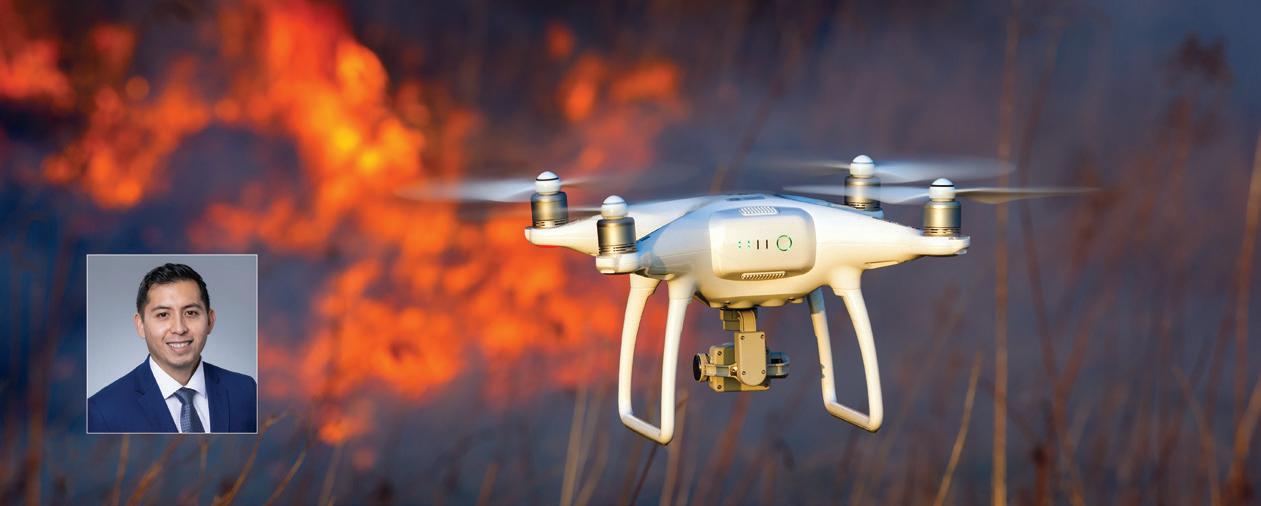 by Isaac Peck, Publisher
by Isaac Peck, Publisher
Over the last two decades, new technologies have given private investigators an increasingly expanded set of tools, gadgets, and equipment they can use to capture surveillance, gather intel, and provide better information and service to their clients.
Drones are a perfect example.
The use of drones in cases continues to multiply. Already widely used by all three branches of the U.S. military, civilian police departments are now exploring using drones in mass to help monitor and report in communities. However, for Private Investigators, the use of drones in investigations is still a budding practice. Working PI sat down with Jay Paulino, CPI and CALI’s 2022 Private Investigator of the Year, to learn more about how he has integrated drones into his practice and what he sees for the future of this dynamic technology.
Question: Tell me a little about your background and how you got started as a private investigator?
Paulino: I was in college studying Criminal Justice and I attended a job fair where a PI company came and gave a
presentation. I was really impressed with their presentation and the work really interested me. At the end of his presentation, he gave one-on-one interviews looking to hire someone in the San Diego area. He saw something in me and gave me an opportunity. I got my foot in the door doing surveillance for worker’s comp cases—doing stakeouts, mobile surveillance, filming undercover with pinhole cameras. There was a lot of fun stuff like that—a lot of adrenaline on some of those cases. I accumulated my hours and eventually got licensed with the state of California.
I ended up dropping out of college and started working as a PI when I was just 19 years old. From a young age I’ve had to look out for myself and live on my own, so when this opportunity presented itself to me, I jumped on it. I eventually moved on to doing internal investigations for insurance carriers as an Insurance Examiner. I investigated material damage and liability.
After working on the insurance carrier side for a few years, I ended up doing internal investigations for plaintiff law firms. From there, I had an opportunity with a law firm from
10 Working PI | Spring 2023
“
I’m working with attorneys who sometimes can’t go out there and look at the scene themselves.”
Jay Paulino
Florida that wanted to open up an office here in San Diego and they were looking for a bilingual investigator.
I’ve been with my firm, Casey Gerry Schenk Francavilla Blatt & Penfield, LLP, for six years. I work on a lot of wrongful death cases, auto accidents, automobiles that hit pedestrians, fire investigations, defective product manufacturing, premises liability cases, and more. My firm also specializes in aviation cases, brain injury cases, and sports injury cases—so I get to work on a variety of very interesting cases.
One of the most impactful things about my work is seeing how people’s lives can change in an instant. Some of the clients we represent have just graduated from University, they’re ready to take on their dream job, or they’re about to get married, and then there’s an accident and half of their body is paralyzed or they’re injured so badly they can barely speak or can’t answer simple questions. I see a lot of people get their lives taken away from them. They’re very hard cases to look at.
Question: When did you first start using drones? How have you used drones in your investigations?
Paulino: Right before the COVID-19 pandemic hit, we were working a wrongful death case where a cyclist was hit by a car on an onramp and passed away. It happened before sunset so there was still daylight. I went out there on foot and took photographs of the area. I put a dash-cam on my car and did a perspective of what that must’ve looked like for the defendant. We went back out on the one year anniversary of the accident to get the same lighting conditions, at the same time, etc.
We went with an expert who specializes in reconstruction work. This expert had brought a drone with him to help do the site reconstruction. He flew the same route the defendant was driving and got an aerial perspective of the scene. We noticed shadows from a nearby tree. Was lighting a factor for the driver? Was sunlight a factor? Looking at it from a birds-eye view, we were able to notice additional details that I hadn’t seen when I was on foot. We got a better view overall of the scene—it really allowed for a broader perspective.
So that was really my inspiration. I remember asking him a lot of questions. What type of drone is that? How does this work? How do you get a license to do that? The COVID-19 pandemic hit almost right after that happened, so things slowed down a lot for everyone. I met many people for in-person interviews for my job, so I couldn’t do that for a while. I had a lot more time to explore using drones as a tool. During the pandemic, I did some soul searching and was really asking how I could be more effective as a PI, what I could do differently, how I could improve the quality of my work, and so on.
I was really excited to integrate drones into my practice.
I learned I needed to get my Remote Pilot Certificate and started studying for it. I took my exam and was fortunate enough to pass on my first try. I got my certificate and my insurance and shortly after I began using drones at my site inspections when I was looking at crashes.
When we would do presentations on the cases for the partners at our firm, I started presenting the aerial photographs and videos from my drone and everyone was really impressed. Work quality was massively improved.
Before I had a drone, we would go out on foot if we were working a catastrophic collision on the freeway. Typically we’d put on safety vests, park on the shoulder, get out and walk along the freeway on the shoulder and take photos of the skid-marks and debris. An on-foot inspection of a freeway incident can only tell so much. It’s also dangerous— something can go wrong out there. I’d also have to carry a lot of gear with me.
With my drone, I can park somewhere a lot safer. I don’t have to park on the shoulder. I can fly my drone from a safe location and get better photographs of skid marks and debris. You need a steady hand when taking pictures and photos, but the drone takes care of that for me. I’m not necessarily out in the hot sun and I don’t have to carry so much equipment. I’m working smarter, not harder. I can get better photographs and videos and get a better perspective with a drone. These drones can shoot in high resolution. It also helps us tell a story. In our profession, it’s all about storytelling. In my particular position, I work with attorneys who sometimes can’t go out there and look at the scene themselves. So, I can better serve the attorneys by showing them videos that can paint the whole picture and give them a full perspective.
Question: Talk to us more about using drones in the field. What other types of investigation assignments might drones be useful in?
Paulino: Drones are useful in any assignment where a sky level perspective will help your investigation. They can also help you cover larger areas with less effort while also giving you a better work product.
Right now, I am mostly using my drone for personal injury and accident reconstruction, but I think there’s a world of opportunity out there. It’s been really interesting for me to speak to other PIs and hear how they are using drones in their investigations. Some PIs have told me that a drone can be a very good tool when doing investigations in public areas.
I think PIs can take it to a whole other level compared to what I’m doing. We can potentially use drones to help find missing people, or in surveillance work, and the list goes on.
Spring 2023 | Working PI 11 page 12
Right now, there is a debate about using drones as it relates to being an invasion of privacy. The consensus so far is that you can fly a drone in public areas, but you can’t fly a drone to invade someone’s privacy.
The use of drones in the private sector and even law enforcement is just beginning. The Chula Vista Police Department here in San Diego, California started using drones a few years ago; they were one of the first law enforcement agencies to do that. Looking to the future, I see all kinds of professionals adding drones to their toolbox. We will continue to find new ways to do things—safer and better. I’m excited to see the career opportunities that drones will also bring to new users and new generations to come.
Question: What advice do you have for private investigators interested in adding a drone to their practice?
Paulino: I encourage PIs to learn more about the FAA’s requirements and to study for their Remote Pilot Certificate (Part 107). Then get a drone and practice! I found it to be a lot of fun. I practiced a lot in a safe environment and that prepared me to use a drone in the field.
Because we’re using drones for commercial purposes, we need to get the Remote Pilot Certificate (Part 107). I attended an online school (Drone Pilot Ground School) in preparation for my Part 107 certificate. I studied for four months. The exam
was actually pretty difficult. If I didn’t obsess over my studying the way that I did, I wouldn’t have passed. I had already made my appointment to take the test so there was no way out for me! I had to be ready by the date I had set for myself. Fortunate enough, after all those hours I put into it, I took the test and I passed.
In addition to getting your Remote Pilot Certificate (Part 107) to use drones commercially, PIs should carry insurance to cover liabilities. I currently use the DJI Mavic Pro 2, DJI Mini 2, and the Skydio 2 +. For beginners, I recommend the Skydio 2 + due to the autonomous advantages and additional sensors for obstacle avoidance. Having these extra features helps fly the drone safely and assists the operator to avoid collisions. To have a safer experience, it also helps to understand the area where you will be flying. You want to be familiar with potential hazardous objects that could obscure your vision, cause a fire, cause a crash or an injury.
For drone insurance, I use an application on my iPhone by the name of SkyWatch. This app makes it convenient to purchase insurance and it’s also affordable. I can purchase insurance at a lower cost when buying it for a specific date and time, versus paying more to hold a monthly policy. If you are not flying your drone 5 days out of the week for work, I recommend buying drone insurance for specific
TIPS , TRICKS & ADVICE FOR PROFESSIONAL PRIVATE INVESTIGATORS
FREE Private Investigator Training Videos

✓ Surveillance
✓ TSCM Bug Sweeps
✓ Running a PI Business
✓ Marketing a PI Business

✓ Sales Techniques for PIs
✓ PI Case Studies and Stories @JohnMorrisThePIGuy
12 Working PI | Spring 2023
page 11
www.youtube.com/@JohnMorrisThePIGuy FreePrivateInvestigatorTraining.com YouTube Channel


Grow Your Business with Digital Investigations
Cloud
Forensics
Investigations
Digital Investigative Training Courses
Person and Online)
We Provide the Tools and Training You Need Expand your services | Attract new clientele | Increase your income Digital Investigations are a rapidly growing field—Now you can help. Start Today! Visit Paraben.com or Email forensics@paraben.com
Smartphone Forensics iOs, Android Os, IoT, &
Computer
Windows, Email, Internet, Servers & Cloud Email
Outlook, Exchange, Office365, and more
(In
Smartphones, Computers, Fundamentals
What You Need to Know Before Hiring a Fire and Explosion Investigator
by James T. Born, PI, CFI, INCI, MIAAI
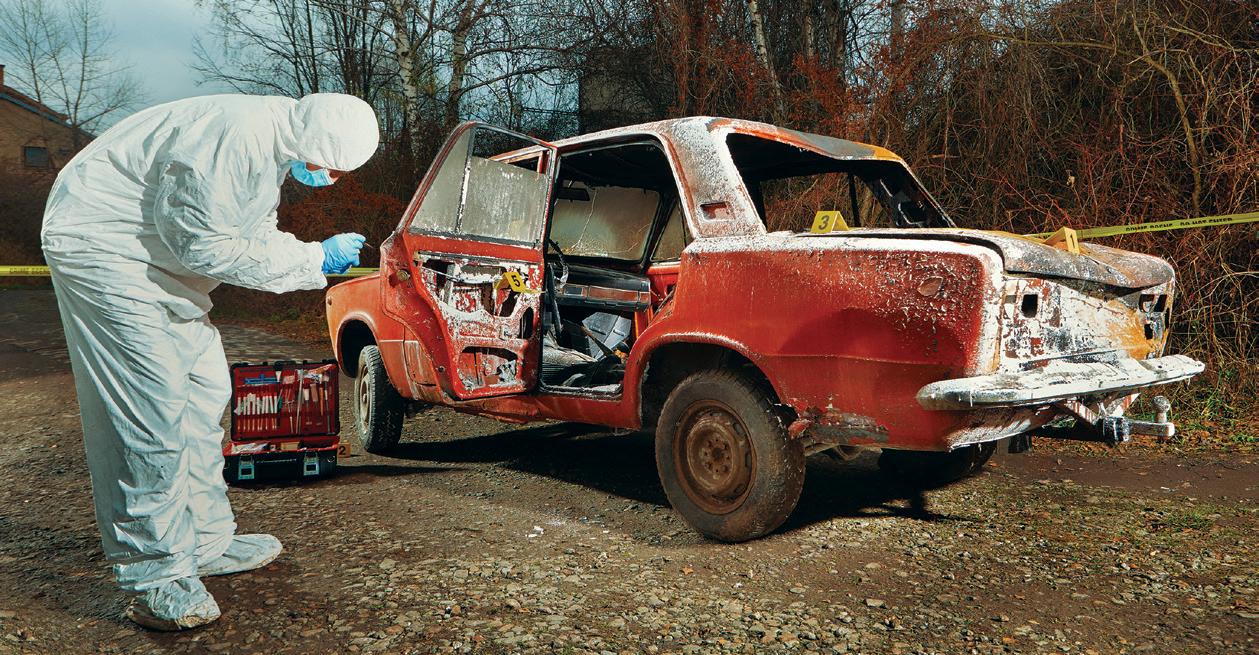
“The human race has been trying to understand fire since the beginning of time, all whilst living alongside it.”
In disclosure, and by way of introduction; My name is Jim Born. I have been licensed, continuously, as a California Private Investigator for over 44 years and have over 54 years of experience as a Private Investigator and Fire Investigator, including employment as a city, county and federal law enforcement officer. ESI is a world class fire investigation and multi-structured engineering firm, operating in 42 states, complete with their own Fire Testing Laboratory—staffed with 12 scientists.
I am also a Certified National Association of Fire Investigators (NAFI) Fire and Explosion Investigator, a United States Government (SAM) authorized “Investigative Services” and “Fire In-
vestigator” contractor, and a state of Nevada “Fire Investigator” EPRO contractor. I am a Subject Matter “Forensic Expert”, “Fire Investigator”, “Law Enforcement Instructor”, and law enforcement “Curriculum Reviewer”; for the International Association of Directors of Law Enforcement Standards and Training (they approve Peace Officer Standards and Training (POST) for police in 45 states, as well as for the United States Department of Justice). I am a recognized “Fingerprint Expert” and “Forensic Expert” with the 8th Judicial District Courts (from different homicide cases).
However, I am not an attorney. With that said, I admonish you to always consult
with a licensed attorney-at-law, before taking any actions or making any decisions based upon this writing, or any similar writings, that may affect you or your business. In addition, I have no malice or ill intentions towards anyone in the profession, and have only the good intentions of making the public aware of using good common sense before employing someone to conduct a fire or explosion investigation so they do not lose their case.
It is my personal opinion that the fire investigation industry, has been flooded with unlicensed, unregulated, nonsubject matter experts, and unqualified, untrained, undertrained and inexperi-
page 16
14 Working PI | Spring 2023
Results





























are not obtained through a database, rather completed by highly trained research specialists through legal means that will save you investigative hours, using techniques not available to the general public.
?
assets
collection, divorce, probate and court cases.
National Asset and Bank Account Searches
Insurance
Report
Insurance Coverage
specific
Life Insurance—Carrier
Call Today to Learn More: (800) 808-0078 Or Visit JTPalmerAssociates.com WE ALSO SPECIALIZE IN CURRENT EMPLOYMENT PHONE RESEARCH UTILITY SEARCHES FEIN SEARCHES JT Palmer and Associates, LLC operates in full compliance with FCRA, the Fair Debt Collection Practices Act, the GLB Act and all privacy laws.
Our team of research specialists will get you results! We guarantee our information to be current and accurate! EVER WISH YOU COULD HAVE SEARCH RESULTS FASTER
We specialize in locating hidden
and bank accounts for judgment
•
•
Claims
—Provides claims information filed by the subject • Historical
This provides the insurance carrier and pertinent information on a
date of the incident •
information plus additional information if obtained
enced men and women. Many of whom have incorporated, and are offering nationwide services as fire investigators and fire and explosion investigators under what they believe to be corporate veil protection. Because this is very evident in California, I am stepping forward, as a licensee whose business has become infringed on, to express my thoughts regarding this problem. If you are an insurance agency, an attorney, or someone looking to employ someone to investigate your fire or explosion event, you will want to take the few minutes necessary to read on, or instead suffer what may become a negative impact on your life.
Fire and explosions are a daily and unforgiving event. They often take lives, cause injuries, and destroy property. The human race has been trying to understand fire since the beginning of time, all whilst living alongside it. Since then we have learned a lot about the chemistry, movement and life of fire. However, there is still so much more we need to learn.
Some associations, such as the International Association of Arson Investigators (IAAI) make it their business to learn about fire and to train others in fire investigations. I have recently completed my 89th course offered by their CFI-Trainer program, and can attest to their court relied NFPA 1033 “Standard for Professional Qualifications for Fire Investigator” ed2022, and NFPA 921 “Guide for Fire and Explosion Investigations” ed2021 professional training.
At some point, insurance agencies usually become involved following fires and explosions. Many actually employ the investigators themselves to determine the fire and/or explosion’s origin and cause. In essence, these investigators conduct the autopsy of the remaining structure, whatever or wherever that may be, on land or even sea. It is through their reports and evidence collection in which we rely on for answers. During
the investigation process, the courts may become involved, as does the American jury system and ultimately, through due process, determines any existing dispute resolutions, as evidenced through expert testimony and physical evidence that was presented during the trial process. It is at this point where I place my emphasis and public concern.
What the Court Looks At
First and foremost, in the state of California (and many other states) it is a misdemeanor criminal offense to conduct, or advertise services for, a fire or explosion investigation. Breaking this law is punishable by a first offense $10,000 fine, or by imprisonment of no more than one year—or by both. Not to forget: civil damages that usually follow unlicensed activity violations, that are always significant and can be expected to make a victim whole again.
California Law Department of Consumer Affairs
Chapter 11.3, Article 3 Private Investigators Act Section 7520: “No person shall engage in a business regulated by this chapter; act or assume to act as; or represent himself or herself to be, a licensee unless he or she is licensed under this chapter; and no person shall falsely represent that he or she is employed by a licensee.”
Section 7521.
“A private investigator within the meaning of this chapter is a person, other than an insurance adjuster subject to the provisions of Chapter 1 (commencing with Section 14000) of Division 5 of the Insurance Code, who, for any consideration whatsoever engages in business or accepts employment to furnish or agrees to furnish any person to protect persons pursuant to Section 7521.5, or engages in business or accepts employment to furnish, or agrees to make, or makes, any investigation for the purpose of obtaining, information with reference to:
• Crime or wrongs done or threatened against the United States of America
or any state or territory of the United States of America.
• The identity, habits, conduct, business, occupation, honesty, integrity, credibility, knowledge, trustworthiness, efficiency, loyalty, activity, movement, whereabouts, affiliations, associations, transactions, acts, reputation, or character of any person.
• The location, disposition, or recovery of lost or stolen property.
• The cause or responsibility for fires, libels, losses, accidents, or damage or injury to persons or to property.
• Securing evidence to be used before any court, board, officer, or investigating committee.
• For the purposes of this section, a private investigator is any person, as defined in Section 7512.3, acting for the purpose of investigating, obtaining, and reporting to any employer, or an agent designated by the employer, information concerning the employer’s employees involving questions of integrity, honesty, breach of rules, or other standards of performance of job duties. This section does not apply to a public utility regulated by the Public Utilities Commission, or its employees.
(Amended by Stats. 2018, Ch. 92, Sec. 6. (SB 1289) Effective Nevada State Supreme Court Decision.)
Exception to Licensing
The State of Nevada Private Investigators Licensing Board v. Dwayne Tatalovich and Tatalovich & Associates Incorporated, In the Supreme court, State of Nevada, Case 58803, 129 Nev., Advance Opinion 61 (September 19, 2013).
Referring to the Nevada Private Investigators Licensing Board:
“Its licensing requirement does not apply to experts employed to give an opinion on some aspect(s) of a case where the expert witness performs duties and tasks within his or her field to verify or obtain information necessary to form the basis of the opinion testimony.”
16 Working PI | Spring 2023 page 14

Digital Investigations Can Grow Your Business
by Amber Schroader, Paraben Corporation
When looking for new ways to expand your investigation business, the area of digital investigations can be very lucrative. Digital forensics, also known as digital investigations, serves as a crucial foundation in gathering and analyzing evidence for legal proceedings. Private Investigators can offer valuable services and key insights to a diverse range of clients.
Let’s start with exploring what digital forensics is. Digital forensics is a branch of forensic science encompassing the recovery, investigation, examination, and analysis of material found in digital devices, often in relation to mobile devices and computer crime. There are multiple areas of digital forensics that can be used in private investigations that will provide a wide range of options for clients.
The different areas of digital investigations can provide a new profit center for your business (See Figure 1:
Fields of Practice in Digital Forensics). Each specific field and specialization will require different skills, training, certification, and technology. Certain areas might be very appealing for private investigator clients. Examine the area of mobile forensics, for example. Mobile devices are common items associated with every individual and certainly play a role in every case.
When exploring new growth opportunities for your business, it's important to weigh the costs of expansion against the potential benefits. One essential aspect of expanding into a new area is obtaining basic training.
In digital forensics you need to learn the principles of the field to start with the proper foundation of knowledge. Online courses such as Digital Forensic Fundamentals are an excellent way to learn the basics. This vendorneutral course provides a comprehensive overview of the principles and perspectives of digital forensics. (Visit
https://paraben.com/dfir-training-3/ to learn more.)
Specialized Training
Once you have a foundational understanding of digital forensics as a whole, more specialized training in a particular field should be next. Again, focusing on the example of mobile forensics, there are a few areas where it can be used as a service on its own or as an add-on service in your practice.
Regarding mobile forensics training, often receiving it from the technology provider of the tool you select will benefit you the most. However, the training curriculum that is taught must be about foundational mobile forensic processes along with the use of the tool. An example of this style of curriculum can be found at WorkingPImag.com/trainingexample. Completing training that only shows how a tool works will cause you to miss out on the processes and details that take you from just clicking
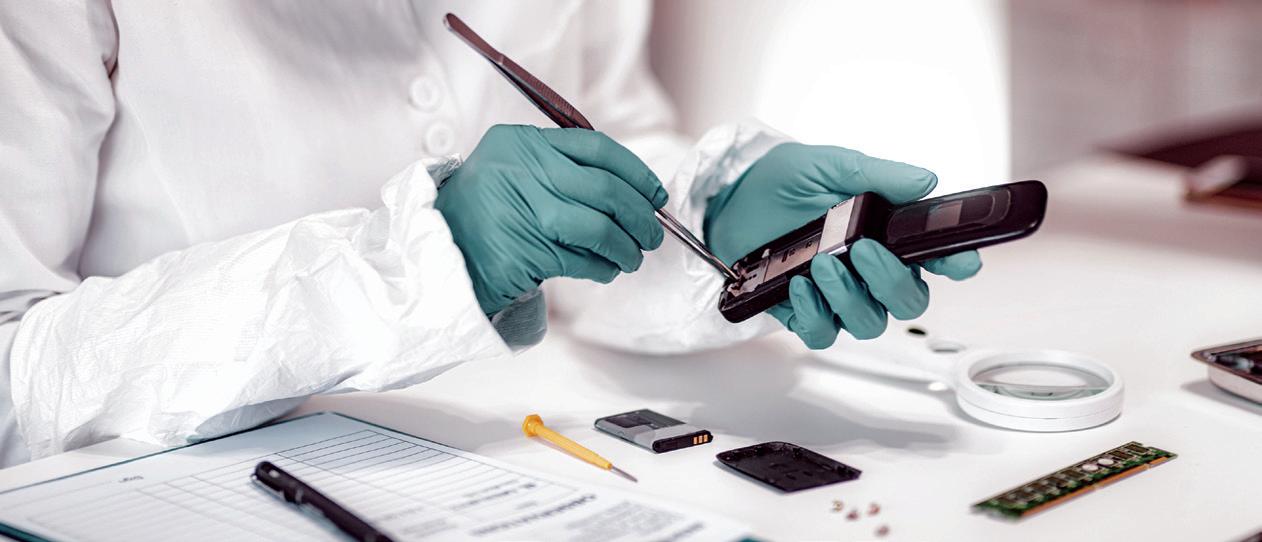
18 Working PI | Spring 2023
“Most of these areas can yield a quick and easy return after a bit of training and time spent getting familiar with the field.”
through buttons to understanding the data behind the buttons. Understanding the method behind the results allows you to offer a better overall service to your client.
Digital Forensic Tools
Examining the tools and technology used in the specialty you choose to expand into is vital. All technology in digital forensics is specialized to maintain the forensic principles of the data and produce the desired result. Pricing on technology can range from free, open-source options to mid-range tech with broad capabilities, to expensive options over $20,000. When dealing with digital evidence, it is essential to implement a cross-validation process, which is what makes digital forensics a branch of science. Cross-validation often requires purchasing more than one piece of technology. Open source options, such as a tool called Autopsy (Autopsy.com), are great options for a secondary tool, while your primary tool might be something on the commercial side, such as the E3 Forensic Platform (Paraben.com/digital-investigation-tools/). The more tools you have to use, the more options and services you can offer your clients.
Other Equipment
Other than the technology and training, you will also need other items to aid in the process of digital forensics. With mobile forensics, you will need the use of various Faraday technologies (search "Faraday cage" on Wikipedia.com ) to ensure the devices are isolated from the network. With computer forensics, you need specific write protectors to protect the drive during the imaging process. The read-only requirements of computer forensics can cost more because of data storage and specialized equipment items.
Another cost factor is the computer the technology is running on. One fundamental principle in digital forensics is that you cannot process potential evidence on the same machine you use for your general work. Investment in a machine dedicated to digital forensics doesn’t have to break the bank. Most of the technology providers will list the hardware recommendations for their tools. The best recommendation is a lot of RAM in the machine to make the process faster.
After all the overhead is evaluated, it is time to look at what the return on your investment can potentially bring
you. You should start by identifying your target market. As stated earlier, mobile devices are so prevalent that they are involved in many market opportunities. Many companies provide smartphones and tablets for their employees, but not every company has someone on staff to process those devices when the need arises. Another opportunity lies in partnering with local attorneys who may require digital forensics services for their clients. Additionally, the consumer market offers a steady demand for services such as malware and spyware processing and data recovery.
The potential for people to come to you for this specialized skill are almost endless. Figuring out the fee you are going to charge is very important. Many investigators choose to add these new offerings as an additional item in their hourly billing. There are arguments against this method as the different billing rates, one for normal work and one for specialized work, can get confusing to a customer. Instead, it can be beneficial to use flat-rate billing with an additional hourly rate after the flat rate time has ended. This approach can be budget-friendly to both parties and allow you to determine how many jobs must be completed to recover the overhead that was spent to start in the field. This type of billing can be done with both mobile forensics and computer forensics. Clients prefer to know upfront what to expect in terms of cost.
Digital forensics, as a field, has many different specialties and areas for expansion for private investigators. Most of these areas can yield a quick and easy return after a bit of training and time spent getting familiar with the field. Providing light-level services and relying on other firms with time in the field to do expert testimony can relieve some of the pressure that might have kept you out of this area of investigative services. As a natural investigator, incorporating some enhanced digital skills will produce a new profit center for your organization.

Spring 2023 | Working PI 19
Figure 1: Fields of Practice in Digital Forensics
MAYOR SUES INVESTIGATOR : When Politics and Surveillance Intersect
by Kendra Budd,
This time, it's the PI who got caught.
It's no secret that private investigators (PIs) are frequently hired to surveil and conduct deep background checks on public servants, politicians, and political candidates (although apparently not for George Santos!).
In the case of surveillance, these types of high-profile jobs almost always fly under the radar. Political figures likely suspect that someone might be “watching,” but rarely do they catch anyone redhanded or bring the matter into public view (See Political Opponent Hires PI to Follow Judge, visit www.WorkingPImag. com/judge).
However, every once in a while a PI gets caught.
The following case serves as a prime example—not only showing the risks that PIs are exposed to when tasked with high-profile political targets, but also providing a rare, inside look into the inner workings of cut-throat opposition research and political surveillance.
In December 2022, Hillary Schieve, Reno, Nevada’s mayor since 2014, discovered a GPS tracker on her personal vehicle and promptly filed a lawsuit against the PI whom is allegedly responsible, as well as the unknown third-party who hired him. Her lawsuit includes
eight separate “causes of action” against the defendants and accuses the PI of subjecting her to “significant fear and distress.”
Backstory
After taking her car to a local mechanic due to an oil leak, Schieve discovered that someone had installed a “sophisticated GPS tracking device” on her car that was “monitoring her every movement” after the mechanic found the device and showed it to her.
Schieve immediately brought the device to Sparks Police Department (PD), who determined David McNeely was the purchaser of the device. McNeely, a resident of Washoe County, Nevada, is a licensed PI in Nevada and the owner of 5 Alpha Industries—his PI agency.
Lawsuit
In less than six weeks following her discovery, Schieve filed a lawsuit against McNeely and 5 Alpha Industries.
Schieve’s lawsuit against McNeeley, and “Does 1 through X” (presumably the third-party that hired McNeeley), accuses the defendants of invasion of privacy (both intrusion upon seclusion and public disclosure of private facts), violation of Nevada’s anti-doxxing laws, trespassing, and civil conspiracy.
Schieve’s complaint alleges McNeely,
under 5 Alpha Industries, trespassed on her private property and installed the GPS device on her personal vehicle. The device then gave minute-by-minute updates on Schieve’s location which were shared with the unidentified third-party.
In addition to seeking damages for the reasons above, Schieve’s suit seeks to reveal who McNeely’s client was, i.e. who hired McNeely to surveil her.
In that regard, a subpoena to reveal the unidentified third-party who hired McNeeley was recently approved by Washoe County District Judge David Hardy in late January. When granting the subpoena, Hardy remarked: “Upon review, this Court finds good cause to permit early discovery for the limited purpose of identifying the ‘Doe’ defendant(s).” Shortly thereafter, McNeely deleted his agency’s 5 Alpha Industries website, and has refused to comment.
Schieve argues that the defendants’ actions “shock the conscience” and caused her significant fear and distress, “as it would cause any reasonable person.” It is worth noting that Schieve is filing the lawsuit as a private citizen, and not in her capacity as mayor.
Schieve commented on the incident in The Nevada Independent saying, “I
20 Working PI | Spring 2023
COVER STORY
“With this increased risk of your cover being blown, it’s important to take the proper safety precautions as an investigator.”
Editor
was shocked. I felt sick to my stomach. I would never want this to happen to a family member, a young girl. It’s an invasion of privacy. It’s stalking. It’s just super alarming.”
It is not uncommon for surveillance targets, whether personal injury plaintiffs or politicians, to equate private investigators simply doing their jobs with “stalking” or “harassment,” as this case demonstrates.
Political Surveillance
After finding the GPS tracker, Schieve, the current mayor of Reno, chose not to take her concerns to the Reno PD, but instead took the case to the Sparks PD in order to “keep clear of any conflict of interest questions.”

Working PI obtained video of the interview that Sparks Police conducted with Schieve after concluding the investigation.
As it turns out, the timing of the placement of the GPS tracker coincided perfectly with Schieve’s election campaign—spanning nearly a month directly before Reno’s election day.
The 2022 Reno mayoral election was held
on November 8, 2022. Schieve’s conversation with the Sparks Police investigators reveals that the GPS tracker was placed on her vehicle on October 12th around 3 a.m., and was discovered by her mechanic on Nov. 4th, just four days prior to the election.
Schieve’s interview with Sparks Police took place only a few weeks after she won the Reno mayoral election. In the video, Schieve laments the tough political climate that she has endured, saying that her political opponents had spread lies about her having a relationship with the Police Chief, claimed that she was killing babies for endorsements, and falsely accused her of getting pulled over for a DUI. “They put out all these crazy, outlandish lies. The problem is I think many of their supporters actually believed them,” Schieve reports.
In her interview with Sparks Police, Schieve complains of stalkers and having a general sense of being watched in the months leading up to election day. “There have been strange cars outside my house really late and really early in the morning, like three or four o’clock in the morning. Maybe I am being paranoid but I also often have a sense that I
am being followed. Like, hey, this car is still behind me,” Schieve details.
Schieve names a prominent far-right activist with deep pockets and shares her suspicion that he was behind the surveillance. “They were having a debate that they invited me to. I think part of this is they wanted to find out where I was during this ‘fake’ political debate that they put out there. I think they were hoping to find me at a bar or a club or something instead of being at their debate,” Schieve says in the video.
Schieve tells Sparks Police that a powerful political figure in Reno politics spent over $1M on different political races over the last year and she shared her belief that he has used a number of different PIs to surveil his political opponents. “He has a lot of money but he seems really out there. They were saying that the elections were stolen and broadcasting financial rewards for anyone who could give them information that could get our elected officials arrested,” Schieve reports.
Through a separate interview with
Spring 2023 | Working PI 21 page 22
McNeely (detailed below), Sparks Police investigators confirmed that McNeely never physically surveilled Schieve, meaning he simply installed the GPS tracker and monitored it. One Sparks Police investigator, in an effort to explain the cars that Schieve has seen outside her house and/or following her, suggests that Schieve’s political opponent, “probably just uses PIs all over town” and “there are other people that were possibly following you.”
Referencing the infidelity rumors that were widely publicized in September 2022 regarding Reno Councilman Oscar Delgado (who promptly resigned to “focus on his family”) and Mariluz Garcia (who was elected to the County Commission in Nov. 2022). Schieve speculates that the same political enemies who were surveilling her had put trackers on Garcia’s car to uncover the affair and smear Garcia and Delgado. These political enemies were “trying to use our personal lives” against us to win political points, Schieve tells Sparks Police.
Criminality
This case raises several interesting questions for PIs and for law enforcement generally—mainly because Schieve is an elected official. On one hand, McNeely
did not break any laws in the state of Nevada, but at the same time, stalking, harassing, or threatening an elected official has to be taken seriously by law enforcement.
In their discussion, one of the Sparks investigators explains to Schieve that McNeeley was not intending to harm her and that they don’t have the basis to charge McNeeley with criminal conduct: “He’s not trying to harass you. He’s trying to do his business. It’s common practice for private investigators nowadays to [use these types of trackers]. As much as we disagree with it, there is not a criminal nexus to this as it stands right now. Civilly you may have some options, but criminally we don’t have anything. We checked with the Sparks City attorneys,” says the Sparks Police investigator.
Sparks Police also contacted the FBI, the Secret Service, and other law enforcement agencies to see if there was anything they could do (or anything they could charge the PI with!) about McNeely’s surveillance of Schieve, according to one of the Sparks Police investigators. Ultimately, Sparks Police concluded that no crime had occurred and that there was no criminal element to McNeely’s operations.
In their interview with Schieve, a Sparks PD investigator describes how they identified McNeely. Sparks Police is said to have issued subpoenas to Verizon and AT&T, as well as the company that sells the tracking devices. “The company was very forthright with us and gave us everything we needed. They told us who bought the device, when they bought it, and where it’s been—everything. If they hadn’t been so helpful, we probably wouldn’t be having this conversation,” the Sparks Police investigator tells Schieve.
Some Nevada news outlets have argued that Schieve used her political influence to get Sparks Police to help her investigate the tracker. Interested parties have also insisted that Sparks Police should not have disclosed David McNeely’s name to Schieve, especially since they concluded there was no criminal activity.
In other words, if you’re a private citizen in Nevada and you find a GPS tracker on your car, you likely would encounter great difficulty in tracing it back to the individual who installed it. However, because of her political position, Sparks Police issued numerous subpoenas on her behalf and quickly uncovered this information for her.

Adding fuel to the political fire, Schieve jokingly remarked to the Sparks Police investigators, “Do you guys need a job? We’re hiring!”
At the end of her discussion with Sparks Police, Schieve indicates her desire to change the laws in Nevada to make use of GPS trackers on vehicles illegal, remarking that she is sure she can get someone in the Nevada Legislature to carry the bill. “We’re all in agreement that this is wrong. It wasn’t long ago [2013] that law enforcement didn’t need a warrant [to install a GPS tracker on a car], and there’s no reason a private citizen should be able to do that and invade somebody's privacy in that way. It is wrong,” a Sparks Police investigator tells Schieve.
22 Working PI | Spring 2023
page 21
Confirming Political Motives
David McNeely, a licensed PI and security guard in Nevada, built his career in law enforcement for over 20 years and worked on the Tri-NET Narcotic Task Force in Carson City, Nevada for over a decade before transitioning into PI work. In their conversations with Schieve, Sparks Police investigators tell her that “he is very experienced and highly trained in surveillance. [He] wouldn’t be someone you would notice was following you. He’s also extremely well-trained in electronic surveillance.” Working PI also obtained video copies of the interview that Sparks Police conducted with McNeely in November 2022 after they traced the GPS tracker back to him.
On the tape, Sparks Police are waiting in McNeely’s driveway when he returns home, after which he promptly invites the officers into his house. Officers question McNeely on the type of work he does and he responds: “There’s nothing
that I won’t do as long as it’s within the confines of the law.”
After explaining to McNeely that they’ve traced the GPS tracker used on Schieve’s car back to him and they are investigating whether someone means harm to her, McNeely reveals that his investigation was “political” in nature. “There is no threat to the mayor. I can’t get into too many details on it. It is not with the intent of causing harm to anyone. There were all kinds of [political] allegations that [based on my investigation] were completely unfounded. So, I went back and told the client ‘this person is not doing what you think.’ She seems to be doing what mayors are supposed to do. Super boring—she goes to work, she goes home, that’s it,” McNeely told the officers.
McNeely ultimately said that he could not reveal the name of his client and would need a non-administrative subpoena if Sparks Police wanted that information. “So basically, a warrant,”


remarked one of the Officers.

McNeely said he had a duty of confidentiality to his client and added that his surveillance of Schieve was “nothing personal,”—he was just doing his job.
The Right to Privacy

Schieve’s case raises a number of interesting legal questions—primarily because of her position as a public servant and political figure. Schieve’s original complaint cites Nevada case law (Ringelberg v. Vanguard Integrity Pros.Nevada, Inc.) which indicates that the installation of a GPS tracker implicates the tort of invasion of privacy. In other words, there is case law that, at a minimum, justifies Schieve’s right to bring a lawsuit against McNeely.

However, there is also an argument that a politician who runs for office and serves as a public figure, does not have the same expectation of privacy
page 24
Spring 2023 | Working PI 23
We are a team of dedicated professionals with broad experience in providing a variety of effective solutions. Your one-stop shop for all investigations in Mexico www.piservices.mx email: info@piservices.mx Tel: +52 (55) 8860 8835 Iguala 12 Bis, Col. Roma Sur México City, C.P. 06760 SPECIALIZING IN • Interview Based Investigations • Criminal Defense • Litigation Support • Witness/Claimant Investigations FREE 30 MINUTE CONSULTATION We are here to help! amy@investigativeresults.com (254) 319-6979 WHILE YOU FOCUS ON YOUR BUSINESS, WE FOCUS ON ASSEMBLING THE FACTS YOU NEED TO WIN YOUR CASE Amy & her team were fast, responsive & comprehensive. Just what I needed. —Marc Lenahan TX License A15203
as a private citizen. Similar to the way a personal injury plaintiff waives many of their “rights to privacy” as a result of bringing a claim.
For example, in an article titled “Do Political Candidates Have the Right to Privacy?” published in the Fordham Law Journal , author Kirby Shilling writes that when an individual is sworn into office, “They have waived their privacy rights ‘as the price of admission’ in the political sphere” and that case law has established that ”political figures, have no privacy claim with respect to ‘the flow of truthful information which may be relevant to his qualifications for office,” informs Shilling.
Advice for Private Investigators on High-Profile Investigations
Kelly Riddle, President of Kelmar Global and the lead instructor at PI Institute of Education, has been a private investigator for over 41 years and has firsthand experience with these types of high-profile, political investigations. Riddle sat down with Working PI and shared some insight and advice for PIs who find themselves doing these types of assignments.
For starters, there are always more people involved than a normal surveillance operation. “There are often so many different eyes looking over your shoulder, it can muddy the waters because high-profile investigations usually mean other agencies have already had their hands in the investigation. So, it just kind of complicates everything that you do,” Riddle explains.
Not only do you have to worry about other investigators looking over your shoulder, but you have to be mindful of the people who are also working for your target. In fact, Riddle says that there is a heightened safety issue because of this factor. “A lot of times they have their own executive protection details, or they go to places with heightened security such as the state capital, the white house, court houses, etc. There’s more people watching them, therefore
there is more potential that we’re being observed too.”
With this increased risk of your cover being blown, it’s important to take the proper safety precautions as an investigator. Riddle advises that it is more important than ever for PIs to adhere to confidentiality, ethical standards, their contractual commitments, and laws. “I have seen investigators that have posted on social media about what they were doing. Even without posting who they were surveilling, I’ve seen where it came back and got them in trouble, because the opposition picked up on it. You must remain confidential,” Riddle iterates.
As discussed above, politicians waive at least a part of their “right to privacy” once they begin a campaign. However, that doesn’t mean that investigators can trespass on their property or track their vehicles without permission (depending on state laws). Riddle explains, “Yes, they’re in the public eye but that just means they’ll be in the public a little bit more. Obviously, that makes things easier for us, but it doesn’t necessarily mean we can circumvent all the normal laws we have to deal with.”
As we’ve seen with this case, even if an investigator follows all the applicable laws, they might still end up in trouble. In fact, Riddle says sometimes going to court is part of the territory. However, it isn’t something many investigators need to be too worried about. “If you maintain your ethics and stay within the boundaries of the law, the likelihood of you getting drawn into a lawsuit is lessened. But the fact that you’re involved in a high-profile case at all can drag you into a lawsuit. It does come with the job, which is why you also need to make sure you have good insurance,” Riddle tells us.
Riddle doesn’t necessarily believe all investigators should be doing these type of investigations because of the ramifications, “Just because they’re highprofile, a lot of investigators will turn it down. Realistically, you don’t know who
you’re stepping on. These high-profile people can come back on you and cause problems for you and the industry. So, I understand why a lot of investigators don’t do it.”
Final Thoughts
It is clear from her lawsuit, and the comments Schieve has made to both the press and the Sparks Police investigators, that she is looking to make a strong statement to the political opponents that she believes hired McNeely.
In her conversations with Sparks Police, Schieve makes that clear. “Because of how alarming this [election] cycle has been, I want it very public. I want them to know this isn’t okay, but also just for our safety so they know we’re paying attention. More so than anything, I worry about women and their safety. The fact that [the Sparks Police] have to get an order to [use GPS trackers] but [McNeely] didn’t, is really alarming,” Schieve says.
In response to Judge Hardy’s subpoena to reveal his client, McNeely fired back with a motion to dismiss the entire lawsuit, award him attorney fees, and protect the confidentiality of his client. McNeely’s attorneys write, “Based on his experience in the industry, understanding of client expectations…and the publicity associated with this lawsuit, McNeely believes that if he discloses the identity of the client(s), he will [lose] current clients and [be] unable to obtain new clients, which could be ruinous for his practice as a private investigator.”
In asking the court to dismiss the case, McNeely argues: “There is no allegation that the use of the device was prohibited by Nevada law—it was not. In fact, the use of such devices is a regular and safe practice among private investigators in the State of Nevada.”
This is a developing story. Subscribe to Working PI ’s email edition online at WorkingPImag.com to stay up-to-date on this and other breaking news for the PI profession. Stay safe out there!
24 Working PI | Spring 2023
23
page

The Weinstein Saga: When Power Weaponizes Intelligence
by Tabatha Villegas
“More and more women started coming out of the woodwork to accuse the former film mogul of sexual assault.”
Over the course of five years, the world has become familiarized with former film mogul Harvey Weinstein’s alleged exploits, civil lawsuits, and criminal trial(s) surrounding the extensive sexual offense allegations against him.
But, have you heard of about the involvement of the private investigation firms he hired to surveil (and silence) his accusers? From the women who brought charges against him to the journalists who put themselves in peril willing to uncover the truth, some of the best private investigative agencies in the world made it their mission to silence and discredit anyone coming forward and attempting to unmask the truth.
In this article, we are going to explore

how one of the most notorious figures in Hollywood used his influence and power to protect himself and attempt to secure his public image by utilizing the skills of those who work in private investigation.
Backstory
Its happened time and time again: celebrities calling out the Miramax and The Weinstein Company’s (TWC) founder and producer Harvey Weinstein. Including at awards ceremonies and different media platforms often by making “jokes” about his misconduct with female employees and talent.
One notable instance was at 2013 Oscars, in which when Seth MacFarlane was presenting the female nomi-
nees for best actress and stated, “Congratulations, you five ladies no longer have to pretend to be attracted to Harvey Weinstein.” While the room took part in awkward laughter, the presenter himself remained stoic due to the fact that one of his own close female friends had been one of Weinstein’s victims. This was just one of the many instances in the media where the subject was brought up through humor—a signal to the rest of the world, a warning.
In March of 2015, Filipina-Italian model Ambra Battilana Gutierrez filed a report to the New York Police Department against Harvey Weinstein for allegedly groping her. According to journalist Ronan Farrow, in his book
26 Working PI | Spring 2023
Catch and Kill, the police’s reaction to Gutierrez’s claim was disappointment, not shock, since this was not the first allegation against Weinstein that they had received. The following day, the model teamed up with the NYPD and was able to record Weinstein admitting to the unlawful groping, citing that while he was “sorry,” he was also “used to that.”
Unfortunately for Gutierrez, this evidence wasn't considered enough to incriminate him on even a misdemeanor charge. Weinstein walked free, but media outlets had already picked up on the dropped charges brought against him and news of his sexual misconduct made headlines around the world. The responses that followed suit would ultimately lead to Weinstein’s demise.
Shortly after the world caught wind of the scandal, the #MeToo movement was born where people across the world
started sharing their experiences on surviving sexual assault. In fact, several women came out to tell their own stories of how Weinstein had abused them as well. Other individuals came forward corroborating these women’s stories, but for years before kept quiet out of fear. These allegations were made from encounters that occurred as early as 1990 and would span over the next 30 years.
Over 80 women came forward, among them including actresses Ashley Judd and Rose McGowan—whom would have significant roles in his prosecution. The New York Times was also preparing to release a story that would paint Weinstein in an unflattering light.
Catching wind that his reputation was about to take a hit that would undoubtedly land him in serious trouble, Weinstein lawyered up and hired some of the best private investigation firms to
aid him in silencing those who were speaking out.
Best in The World
As multiple allegations began surfacing back to back with different women coming forward and sharing their experiences with Weinstein, he decided to hire three intelligence firms to keep his public image as a humanitarian and women’s rights advocate intact. Among these agencies were: K2 Intelligence (K2), Kroll, and Black Cube.

The first firm to be employed by Harvey Weinstein was K2. K2 (now K2 Integrity) is run by its founder Jules Kroll who in an interview with TIME magazine stated that he only worked for Weinstein for two weeks before calling it quits. The work that K2 did was that of investigating Gutierrez—digging up her past
page 28

Spring 2023 | Working PI 27
Call Now: 888.808.4802 | Email: info@usabugsweeps.com USABugSweeps, Inc. provides peace of mind in homes, businesses and vehicles. We have the largest network of TSCM professionals across the US and abroad, using the most sophisticated TSCM bug detection and technology. When Your Clients Suspect They’re Being Watched, Listened To, or Followed... RFID Tagging Radio Frequency Bluetooth Detection WiFi Signals Infrared Detection Sim Cards/ Hidden Video Homes Apartments Dorms / Condos Hotel Rooms Conference Rooms Cubicles Offices Restrooms Cell phones Digital Phones Landlines Voice Over IP Vehicle Audio Recording Live and Passive GPS Trackers School Bathrooms Dorm Rooms Locker Rooms Showers
and find any information that would discredit her completely.
In order to do this, K2 hired Italian private investigators to look into the model’s life in Italy. K2 was instructed to make sure that the Manhattan District Attorney (DA) would not press charges against Weinstein. Within those two weeks, K2 acquired a file containing information on the model’s past in Italy including public scandals and private information on her sexual history. K2 members who had previously worked for the DA passed on this information to prosecutors as part of a “revolving door culture,” as Farrow describes, between high profile clients and pricey intelligence firms.
According to Gutierrez, she was brought in for questioning by the NYPD after she helped secure the tape recording and was interrogated by the Sex Crimes Unit where she was questioned about her past in Italy. Within a matter of weeks, Gutierrez had completely been discredited and her charges were dropped by the DA.
After K2 ceased doing business with Weinstein, he obtained the skills of Kroll, and had them pick up where the first firm left off. In Catch and Kill , Farrow details how Kroll persuaded Gutierrez to sign an NDA after they had located her brother in Italy. Believing him to be in danger, she agreed to surrender all of her electronic devices, along with divulging her passwords and giving the intelligence agency permission to search through her personal emails, texts, and social media deleting any and all information that could incriminate Weinstein.
Gutierrez states in her interview with Farrow that a key objective for Kroll was to make sure there were no copies of Weinstein’s confession anywhere, so it would never be replicated or distributed to the public. However, the model was able to feign “loss of memory” in which she emailed herself a copy of the
audio confession without Kroll’s knowledge. Farrow was able to get ahold of the recording without jeopardizing the agreement she signed with Kroll.
Black Cube
Black Cube, known for being ruthless in their investigation practices came into the picture after Weinstein and K2 cut ties. Weinstein hired them to silence accusers and discredit those speaking against him. Weinstein’s lawyer David Boies’s had previously worked with Black Cube on another case. After his recommendation, Boies’s firm signed a contract with Black Cube where $100,000 was wired to the investigation agency for an initial period of work.
On July 11, 2017, a letter of engagement was put in place specifying the services that Black Cube would provide for Weinstein and how Black Cube would get paid (including a retainer and settlement sum). It clearly stated two objectives, “A) Provide intelligence which will help the Client’s efforts to completely stop the publication of a new negative article in a leading NY newspaper. B) Obtain additional content of a book which currently being written and includes harmful information on and about the client.” The letter of engagement also stated that if any further work needed to be done by Weinstein, Black Cube would take it into consideration.
A settlement sum of $190,000 was put into place that would begin its payments on July 10, 2017 starting with $50,000. Once the Engagement Letter was signed, $100,000 was to be paid to Black Cube and ten days after the initial signing, they would receive the last $40,000.
The contract specified that it would take Black Cube four months to achieve the objectives and if they failed to do so within that time frame, a fifth month would be worked free of charge in order to finish the job. The fees for doing such work amounted to a total of $200,000 for the two objectives.
According to the retainer, a $50,000 fee was to be paid by “The Client” in four payments. In addition to the overall fee, there was also a refundable fee to be paid to “The Journalist”, who was a subcontractor under Black Cube whose job was to specifically interview women and find out what they knew then report back to Weinstein. The sum was $40,000 for four months, and each month, “The Journalist” had to interview a total of 10 people. Any quota that was not met by the intelligence officer would be refunded to the client thereafter.
Additionally, a success fee of $300,000 was to be paid once Black Cube squashed The New York Times article and an additional $50,000 for halting the second half of McGowan’s book, BRAVE, which detailed the assault she suffered at Weinstein’s hands. Black Cube had the freedom to decide how they went about and who they utilized to complete these assignments.
The Intelligence
Other subcontractors, hired to help achieve the goals of the mission, were also mentioned in the Black Cube retainer. Among them was “Anna.” The retainer stated that Anna would be a full-time agent and assist Weinstein in anything he needed for the next four months. In turn, he instructed Anna to get close to McGowan.
Anna, whose real name is Stella Penn Pechanac, used another alias known as Diana Filip when befriending McGowan. She assumed the role of a woman’s rights advocate based in London who worked in an investment company. Her job was to get as close as possible to McGowan and collect any intel on whether or not the actress was going to press charges against Weinstein. Her second objective with McGowan was to obtain a copy of her unpublished book. Pechanac achieved both of those goals in the time she was working for Black Cube. In addition to collecting information from McGowan, Pechanac used her first alias, Anna, to try and extract
28 Working PI | Spring 2023
page 27
knowledge from Ben Wallace, a writer for New York Magazine.
Farrow’s book states Anna initially contacted Wallace claiming that she too was a victim of Weinstein’s and wanted to meet up to discuss her experience in hopes of helping with his investigation. While she informed Wallace of her false experiences, Farrow describes, “That she’s gone through something intimate and upsetting…but she was cagey about details.”
Seth Freedman is another individual who worked on Weinstein’s case under Black Cube. Much like Pechanac, Freedman was also tasked with discovering who was going to speak out against Weinstein—and when. Ben Wallace, Ronan Farrow, and Rose McGowan are just three of 91 people Freedman was able to reach as he collected information on Weinstein’s potential enemies.
Convincing McGowan that he was a
writer for The Guardian (which he had been previously), McGowan opened up to Freedman about her experiences and her plans to break the contract she had signed with Weinstein in order to reveal what he had done to her. Eventually this information gave Weinstein the “heads up” to the allegations that were soon to be placed against him. To this day, Freedman has shown no remorse for helping Weinstein because he didn’t do anything “illegal”, and he was just doing “his job.”
Shortly after discovering that she had been tricked, McGowan filed a lawsuit against Weinstein, Black Cube, and two of Weinstein’s former lawyers for attempting to “silence” her. The lawsuit laid out McGowan’s experience with all parties involved, focusing on the deception by Black Cube’s subcontractors Pechanac and Freedman. The document alleges Pechanac stole the second half of McGowan’s book in which she reveals Weinstein to be her rapist. It also
alleges, Pechanac tricked the actress into meeting her under false prentices and sharing undisclosed excerpts of BRAVE, all the while secretly recording the interaction. As was included in her job description, Pechanac went on to share these recordings and the copy of BRAVE with the defendants.
Ultimately, the case was dismissed but by then the damage had already been done to McGowan. Pleading concrete damages, the actress claims that the actions of Weinstein and Black Cube led to her being publicly discredited. At one point mentioned in the suit, Black Cube resorted to defamation of character by branding her as “crazy” when they were unsuccessful in their attempts to have her sign an NDA and monetarily settlement in return for her silence on Weinstein. By using the information they collected on the actress, McGowan claims Weinstein and his team managed to page 30

Spring 2023 | Working PI 29
damage her reputation and credibility to the point where she has lost both personal and professional relationships as well as employment opportunities. The lawsuit goes on to state that McGowan mental health took a hit claiming to have, “sold her home in Hollywood to pay fees and costs associated with recovering from the trauma Defendants caused.”
In regards to attempting to discredit the actress turned activist, Weinstein was temporarily successful.
Controlling the Narrative
One of Weinstein’s big goals was to influence the media and control what they could and could not publish. Due to the large sums of monetary contributions he would make to different news sources, Weinstein was able to get almost, if not every story that depicted him in a negative light, killed—at least for a time. He was incredibly well-connected and used his influence broadly (including alleged blackmail) to control a variety of news outlets and thus successfully avoided having damaging stories printed about his reputation.
Instead, he would have them cover highlights of his upcoming films or slam campaigns on competitors' films who were up against him during award season.
When Farrow decided to pursue a story on how the rich and powerful men in Hollywood take advantage of their stations, using Weinstein as a lead, NBC executive Noah Oppenheim ordered him to stop his investigations. In his book, Farrow reveals how Matt Lauer, former Today Show host at NBC, had sexual misconduct allegations made against him and that Weinstein was aware of this. He claims that NBC stopped all investigations into the Weinstein scandal in order to protect the show host.
Farrow went back and forth with network executive, Oppenheim, on his story until he was ultimately fired right as he was about to release his piece. Farrow then published his expose on Weinstein in October 2017 for The New Yorker in-
stead. The reporter sought advice from others who had also tried taking a stab at investigating Weinstein, but they warned him to move, watch his back, and purchase a gun. They had been tracked by Harvey’s “Army of Spies” as is the title of Farrow’s article. Instead of assistance, they offered safekeeping advice to the journalist who would soon become a target for Black Cube.
While Farrow had been dealing with an unsupportive team at work, he was unknowingly being followed by Black Cube. They tracked his every move by finding out his geo-location whenever he used his phone and answered messages such as emails or texts, sometimes even calls the private investigators would send him. At this, he feared for his safety to the point he devised a plan in case something happened to him.
Double Agent
Roman Khaykin and Igor Ostrovskiy were tasked primarily with following Farrow and reporting his every move back to Weinstein, employed under Black Cube. The duo would often camp their car outside Farrow’s apartment and wait for him to exit the building to track where he was going and who he was meeting with. Farrow eventually caught on. Not long after, Ostrovskiy switched sides.
Ostrovskiy felt that he was breaking the law whilst tracking his target’s geolocation from their mobile devices without Farrow’s permission or access to do so. He contacted Farrow and came clean about his actions. Once Black Cube suspected Ostrovskiy had teamed up with the Pulitzer Prize-winning journalist, they asked him to do a polygraph test. Because Ostrovskiy had taken this job as a subcontractor for Black Cube under his real name, he was now in danger of being found out as a double agent and at risk of becoming a target for not only Black Cube but possibly Weinstein as well. Ostrovskiy stated it wasn't until he found a company called Whistleblower aid that he could safely separate from Black Cube and continue his work as a PI.
Final Thoughts
Ultimately, even Weinstein’s “Army of Spies” couldn’t protect him from the reputational hits and criminal charges that were headed his way. After Farrow released his article in The New Yorker, Weinstein’s stock plummeted. More and more women started coming out of the woodwork to accuse the former film mogul of sexual assault.
In February 2020, Weinstein had to face the music. He was sentenced to 23 years in New York prison and was just found guilty in a Los Angeles court of rape and sexual assault and is facing up to 24 years in prison for his Los Angeles conviction. Weinstein is currently appealing both convictions and seeking a retrial in the Los Angeles court.
Black Cube has refused to comment on the case, but the intelligence group remains active. Ostrovskiy continues to work as a private investigator, although now under his terms and strives to be on the side that uncovers the truth and positively influences the world. Kroll, denounces his work for Weinstein and states he will never work with Weinstein or take on any sexual abuse claims again.
The case of Weinstein started out with women privately, then publicly, alleging that he had sexually abused them. Over the course of several years, reporters had tried to bring these allegations to life only to have their stories killed or their attempts proved futile.
The rich and powerful often use their money and influence to protect themselves, avoid criminal charges, and stay “on top.” But so often, this work is done behind the scenes. However, the Weinstein case provides one of the most public looks into what usually is a private affair. Specifically, how someone with power can wield power to surveil, manipulate, con, blackmail, and control those who stand against them by using PIs as their pawns.
Stay safe out there!
30 Working PI | Spring 2023
page 29
DESIGNED SPECIFICALLY FOR FIRMS LIKE YOU
• Enjoy 8 Hours Online CE for OREP Members
• Blanket Additional Insured endorsement
• Coverage for your independent contractors
• Insurance Carriers Rated "Excellent"
• Coverage for criminal, insurance, and clandestine investigations

• Fire/Accident origin investigations
• Wanted Persons investigations
• Security Contractor Coverage Available
WE KNOW INSURANCE SAVVY PROFESSIONALS TRUST OREP WITH THEIR INSURANCE NEEDS.
PI Shield
COMPREHENSIVE COVERAGE FOR PRIVATE INVESTIGATORS INSURANCE
General Liability and E&O Coverage In One Policy 12,000+ Apply Now at OREP.org/PI OREP Insurance Services, LLC. Calif. Lic. #0K99465
Social Media Investigations
by Kendra Budd, Editor
“You might not even realize the plethora of information that you’re sitting on until it’s been stolen right from underneath you.”
We have all heard it before: be careful of what you put on the internet. Well, most people nowadays don’t heed that warning—and thankfully, that just makes things easier for private investigators. These days, people are masters at incriminating themselves through their social media accounts. As PIs, we just have to know the proper techniques for uncovering that information.
In March of 2022, Working PI was able to attend our first conference: The 38th Annual INTELLENET Conference, where Cynthia Hetherington shared her expertise on how to use social media in investigations. Hetherington is a leader in her field and President of the Hetherington Group, a consulting, publishing, and training firm that specializes in due diligence, corporate intelligence, and cyber investigations.
Social media is still a rather new concept. “All of these sites weren’t here when we started. You had to sit outside a house for hours on end or even hide behind a trash can,” Hetherington remarks. Finding a person’s online profile isn’t necessarily any easier. However, getting a hold of these accounts is one of the most important steps you can take in an investigation. They can offer valuable information on someone’s present and past behaviors, social circles, and political affiliations or opinions.
Luckily, Hetherington has a leg up in the industry. Before she was an investigator, Hetherington was a librarian—researching is in her blood. “I was Google,” she says, “but I was also giving away my information for free.” So naturally, she became a private investigator who was able to ap-
ply her librarian abilities to all types of investigations.
The Role of Social Media
First and foremost, we need to properly define the role social media plays in private investigations. Hetherington urges investigators to remember that it’s secondary evidence at best. “Social media is always hearsay until other evidence is presented. However, it is still going to be your biggest ally in finding leads,” reports Hetherington.
For example, people like to overshare on social media. Maybe the person you are investigating has posted a confession about performing illegal activity. “You would be shocked to find out how many people have tweeted a confession that they drove home drunk,” Hetherington recounts. Social media allows you to easily discern your client’s

32 Working PI | Spring 2023
activities based on what groups they’re a part of, the accounts they like or follow, and even events they are attending. Most importantly, you’ll see the connections they have made. “Their friends list will be full of coworkers who may offer helpful information, and the classic oversharing family members. People love to post the most helpful details for private investigators, whether they realize it not—even location, workplace, and relationship statuses,” says Hetherington.
Social media is the ultimate rabbit hole of potential information.
Databases
So how do we navigate the rabbit hole of never-ending material? Well, Hetherington suggests two search databases.
• Ferretly is a great database if you need to search for specific, and often incriminating, evidence on a person’s social media profile. “Ferretly
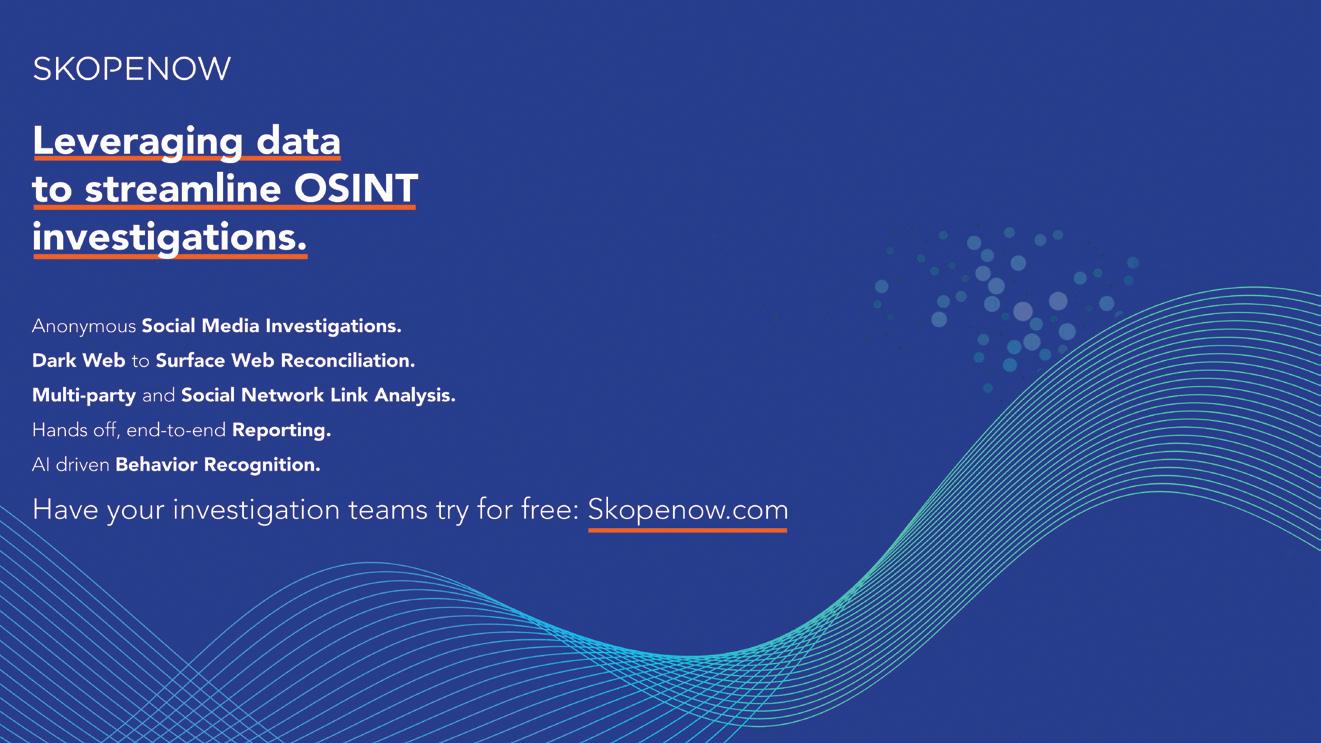
runs social media profiles for free, but you do need to know the individual’s handles for this first. This database’s main purpose is to search profiles for specific criteria including hate speech and foul language. However, you can also use it to search specific words or phrases,” Hetherington reports. So, if you want to find out if they have posted about a person or an event, this will show you every time they did so.
• CARA Analysis can comb through various profiles to find the same as Ferretly, but it asks for more information on your end. “CARA will ask for some of the following: height and weight, contact information, business partners, opinions, academic history, sexual preference, illnesses and much more. Your job is to fill out as much as this information as you can,” Hetherington informs. This database is great at examining all
the potential matches you’ll come across, especially if your target has a common first and last name. Therefore, you’ll need your client to give you as many details as possible to find your specific target.
These are just two out of thousands of databases, but Hetherington swears by them. Nevertheless, she does warn investigators to be smart when using them, “I never trust a database to give me everything. It’s a great tool to strengthen my search. These tools are a great first step in the investigation, but you have to make sure you’re also searching for other evidence to support your findings,” Hetherington advises.
Searching a Timeline
Once you find your target's social media profiles, you’ll want to search their timelines for any relevant evidence page 34
Spring 2023 | Working PI 33
and information. A timeline can usually be found on their profile—it will contain all of their public posts, photos, friends list, events attended or created by them, etc. This is especially true for Facebook users.
If you’re going to search for a profile on Facebook, make sure you have created your own account as well, otherwise you won’t be able to access profiles. “Once you find an account you can use the ‘search profile’ feature, usually found in the top right-hand corner of the site. This will allow you to find any post, photo and any other visible activity they’ve made via keywords”, Hetherington says. She also tells us you’ll be able to shrink your searches by entering any valid dates in this feature.
However, this feature will not always be available. “If it’s not, take a look at the URL for the profile page. If it has a question mark in it that means their profile-id number is hidden. This is when their profile picture will come in handy. Download the picture and run a reverse image search on it. This will pull up the same photo and show the URL with the id-number instead of the question mark. Once you enter this new URL, you should be able to access the search profile feature,” informs Hetherington.
Next, you’re going to want to look at their friends list. “These lists are often a good indicator of who your target surrounds themselves with. They can be coworkers, family, and potential people to interview,” Hetherington attests. Their friends’ profiles may provide insight on how they know your target, and if they could potentially lead you to valuable information.
Finally, an important aspect you’ll want to search is your target’s “likes.” This can be particularly useful if you’re investigating a business. “A person or business’s likes will reveal their affiliates, opinions, and events they might regularly participate in. This is all considered valuable information when build-
ing your case. You’d be shocked to see some of the incriminating pages people like on Facebook,” Hetherington reports.
Many of these same tips can be used on other websites as well, including LinkedIn. “[LinkedIn] is your best friend. It is more formal and gives you a lot of information. LinkedIn will give you insight into where the person works, their full name, contact information and even their preferred pro-nouns (sometimes). More importantly it will show you who is endorsing and recommending this person,” says Hetherington.
Hetherington suggests taking a look at their reviews too, both good and bad. “Finding the right connections between people can often uncover otherwise tough information to find. My job isn’t to find out whether something is legal or not, it’s to find the connections. And that is what all these platforms have in common; they are all about connecting,” remarks Hetherington.
Other platforms to search include, Twitter, Instagram, TikTok, Reddit, and Parler. All of these websites have similar search features to Facebook and LinkedIn, but Hetherington suggests starting with those before moving on to the others. Searching a person’s online profile is only one of many ways to find information through the power of social media.
Another successful technique is going back to the classic search engine: Google.
Google For Deep Searches
Google carries a deep plethora of searchable content, but wading through the never-ending information can be difficult and stressful. Hetherington lives by one motto when it comes to Google, “Google can’t solve crimes. But Google in your hands can.”
A good technique to use for Google is to turn on your alert function. If your target has a website you can set up Google to alert you when there is change
on it. Furthermore, the same goes for if they update their social media profiles, or if their name comes up on another site or database. This feature will allow the evidence to come to you as it presents itself.
“Another good rule of thumb when making your searches on Google, is to employ the asterisk (*). An asterisk will broaden your search. When you use it with distinctive word stems, Google will retrieve a variation of terms with less typing, essentially saving you multiple searches, and instead bringing up the best possible results in one click,” advises Hetherington.
An additional useful tool is the plus sign (+), this will help broaden your search by eliminating your search history. “When we search anything on Google, it will use an algorithm based on our past search history to find the most relevant results for us. Adding the plus sign at the end of a word will give us all possible search results that are the most relevant to the words themselves,” Hetherington says.
These same tactics can usually be used on multiple different search engines, but Google tends to be the most reliable and typically protects your privacy better than other sites. As a private investigator, your privacy should be held to the highest regard.
Investigator Safety
Hetherington was able to remind investigators that when investigating, your privacy is of the utmost importance. These days, data stealing is a huge problem, and as an investigator you’re more than likely holding on to a lot of people’s personal information—including your own.
What Hetherington recommends is simple: make fake profiles, never post personal information and to continually clean your computers.
Making a fake profile is vital for you to have as a private investigator.
34 Working PI | Spring 2023
page 33
Hetherington says, “Let’s say you want to connect with a friend of someone you’re investigating. If you use your personal profile, odds are they won’t add you when they see ‘PI’ listed as your job. However, if you make a fake profile, filled with similar interests, employment, etc. then you’ll be able to make that connection easier.” This includes using a profile picture without your face. “I have two methods I go by,” Hetherington informs, “Cute cuddly animals and coffee cups.” Creating a separate profile from your personal one, will also allow you to keep your private life separate from your work.
More importantly, it will keep you and those close to you safe. According to Hetherington, “I do like having fake profiles, but not so I can get into private accounts, but so they can’t see me looking at them.” That’s right, if people know how to work a social media site
correctly, then they can see who's looking at them. “By not using a fake account, you could be setting off a huge red flag to your target. They’ll start to wonder, ‘Hey, why is this private investigator looking at me twice a day?’ Essentially forcing them to private all of their profiles.”
Despite taking this precaution, some people will get tipped off that you’re investigating them, so it’s imperative as a PI never to post personal information. Hetherington warns, “If my name is out there, you can find anything about me. Just like with law enforcement, they will often have social media profiles with pictures of their kids and loved ones. Then the news will post their full name—telling the world about a drug bust they were a part of. Can we not do that?” Obviously, you can still have a profile to connect with people and potential clients, but in the private inves-

tigation business, it is best to keep your loved ones safe by never posting about them. Even if you keep your account private, people have ways of getting access to that information.
Finally, Hetherington urges everyone to clean out their computers regularly. “You might not even realize the plethora of information you’re sitting on until it’s been stolen right from underneath you. This is luckily an easy step. Sometimes you can download software to do the cleanup for you, but you don’t have to. You can easily do it yourself by removing cookies, certain downloads, and unplugging and re-plugging your router once a week. It also doesn’t hurt to install firewalls into your computers and software,” suggests Hetherington. Remember this will not only protect your personal information, but from page 40
Spring 2023 | Working PI 35
The Investigation of Missing and Exploited Children
 by Joseph A. Travers, CPI, CCDI, CMECI
by Joseph A. Travers, CPI, CCDI, CMECI
“What once was thought as only a problem within developing nations, has become all too real for the US.”
Saved in America (SIA) is a California Non-Profit Organization of current and former Police Officers and Navy SEALs/Marine Raiders turned licensed and insured Private Investigators who, without charge, assist parents and Law Enforcement in locating runaway, missing & exploited children. Since December 2014, SIA has assisted in the investigation and locating more than 260 children nationwide. 60% of all recovered children were found before being trafficked.
SIA Investigative Process
Saved In America cases are structured in 6 steps, R.E.S.C.U.E. (See Figure 1). In all the following cases you will see one or more of these investigative steps used. All SIA Investigators are highly trained former police officers, private investigators, and former special operators (Navy
SEALs, Marine Raiders, British SAS) who are both insured and licensed by the California State Bureau of Security & Investigative Services. SIA's staff also includes Social Networking Investigators, Case Managers, and Attorneys. All SIA Staff and Operators are Certified Missing & Exploited Child Investigators (CMECI).
Step 1: RECORD
Initial Parental/Custodial Contact/ Power of Attorney/Gather Intel/ Plan and Execute:
SIA receives cases in one of two different ways; either a member of the public informs SIA or a parent(s) or guardian will contact SIA. From this point, SIA contacts parents for information on missing children from NCMEC (The National Center for Missing & Exploited Children). Additionally, SIA conducts missing chil-
INITIAL PARENTAL/ CUSTODIAL CONTACT
SOCIAL
NETWORKING
WORKABLE INTELLIGENCE
CASE MANAGEMENT
ACTIONABLE INTELLIGENCE
TRANSPORTATION & REHABILITATION
Figure 1: SIA 6 R.E.S.C.U.E. Steps page 38
36 Working PI | Spring 2023

INITIAL GUARDIAN CONTACT
SIA case investigation based on parent contact or SIA NCMEC investigation
Parent Contacts
SIA
SIA conducts surveillance through computer intelligence, friends and family.
SIA con rms intel discovered during computer intel gathering and other investigations.
SIA Case investigation with high risk shelters
High Risk Shelter is the guardian of children
SIA follows runaways, observes and conducts surveillance
dren investigations by geographical location by searching the National Center for Missing & Exploited Children website, MissingKids.org.
Once the parent/guardian is contacted, an application for services and power of attorney (POA) is received. The POA allows the SIA team to coordinate with law enforcement, other government agencies, and rehabilitation services in relation to the missing person.
Step 2. EXAMINE
Initiate Social Networking Investigation Matrix/ Incorporate Intelligence/ Develop Law Enforcement Liaison: After collecting the requested information from the parent(s), the case is then forwarded to a Social Networking Investigator, a specially trained SIA investigator collects and processes digital information looking for leads.
SIA Collects Intel in the form of pictures, video and reports or compiles into case package.
SIA Locates Child based on actionable leads and contacts Law Enforcement
SIA provides workable leads to law enforcements to investigate which turns into actionable leads
AND REHAB
Child Recovery | Definition. A child that is transported, voluntarily returns or arrested back in the custody of their guardian or rehabilitation facility and is no longer a high risk to human traf cking.
Child is transported to rehab/Recovered/Taken off streets
Child voluntarily returns home
Law enforcement assist in recovery by arrest
SIA communicates with high risk shelter Staff
SIA collects intel through activity/incident reports, collects photos, videos and license plates
SIA continues investigation, relocating resident if lost and communicates with High Risk Shelter which in some cases contacts Law enforcement to assist
The Social Networking Investigator targets leads from social networking sites for workable intelligence. The Case Manager then combines all intelligence to find workable leads. The Law Enforcement Liaison contacts local law enforcement to advise them of the case findings.
Step 3. SUMMARIZE
Prepare Case Management System/ Incorporate Social Investigation/ Develop Investigative Leads for further Review/ Investigation: Saved In America's Workable Intelligence Investigators confirms leads from social networking and parental/ witness information and tips received from the public. The intelligence is then given to a SIA Team consisting of former law enforcement agents, or the Workable Intelligence Investigators. The Team will work to confirm or discredit the leads. Once confirmed, the intelligence goes to
Law enforcement assist in recovery by arrest
Once residents are located, High Risk Shelter provides transportation to facility
the Case Manager.
Resident returns to facility
Step 4. COORDINATE Confirmation of Investigative Leads/ Coordinate with Law Enforcement Liaison /Develop Recovery Plan: In the Case Management step, the Saved In America Case Manager collects all evidence from SIA investigation teams and organizes reports, photos, video and other investigative intelligence. The Case Manager assists the Social Network Investigator and maintains the Investigative Case Package. (See Figure 2: Saved in America Sample Investigative Case Package flowchart by Tech Ops Coordinator, Frank Bonniwell ).
Step 5. UNITE Brief Recovery Plan/ Execute Identification/ Notify Law Enforcement and Execute recovery: The Actionable Intelligence Investigators consist of SIA's former mili-
38 Working PI | Spring 2023
page 36 01 02 03 04 05 06
INVESTIGATION OR SURVEILLANCE WORKABLE INTEL CASE MANAGEMENT ACTIONABLE INTEL
INTELLIGENCE
TRANSPORT
SIA identi es a recent missing child reported to the National Center of Missing and Exploited Children.
Figure 2: Saved in America flowchart created by Tech Ops Coordinator, Frank Bonniwell
tary special operators (majority Navy SEALs, Raiders, and British SAS). When the Workable Intelligence Investigators have identified the victim(s), suspect(s), or an immediate associate, they pass the information on to the Actionable Intelligence Investigators. The teams will use the workable intelligence, verified by the Case Manager, to locate the child. Once located, the team immediately coordinates with law enforcement for the rescue of the child and the arrest of the predator(s).
Step 6. EQUALIZE
Recovery & Rehabilitation:
The Actionable Intelligence Team, made up of Actionable Intelligence Investigators, will transport the child to a pre-approved rehabilitation center, police station, or return them to their home/family, in coordination
with the parent/guardian(s).
Follow-up Investigation and Civil/ Criminal Prosecution:
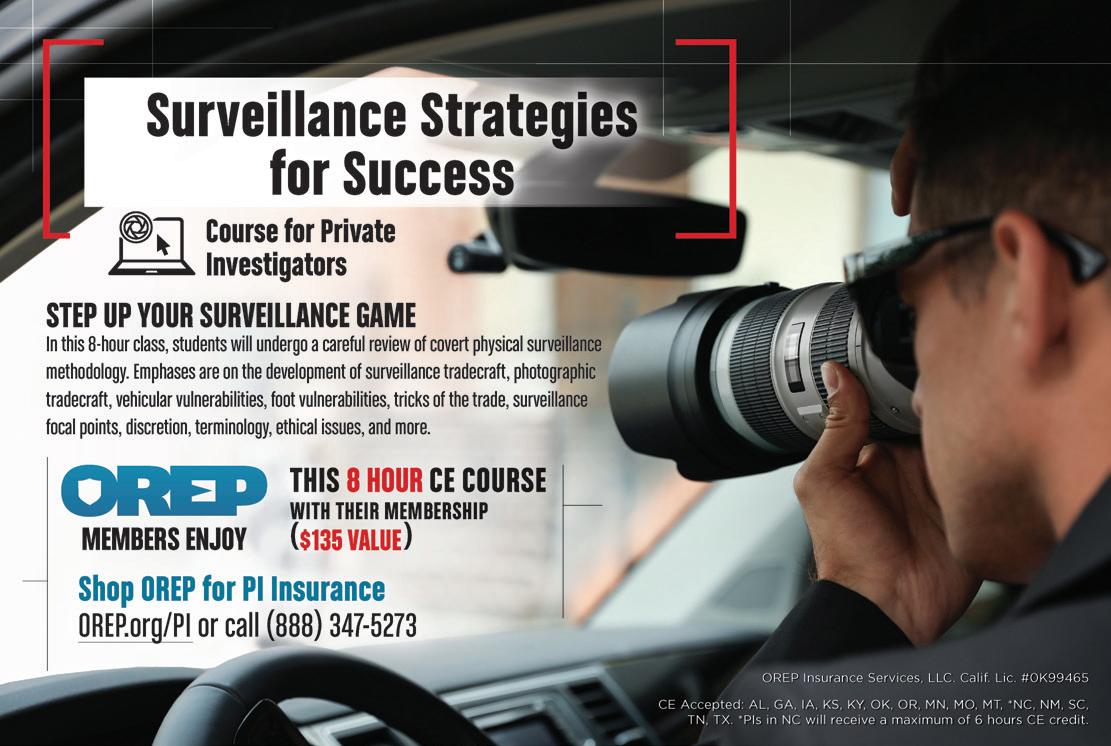

The Case Manager will continue to accumulate follow up intelligence to supply to law enforcement for criminal prosecution and to SIA attorneys for civil action.
Why it Matters
Child sex trafficking has grown significantly over the years. What once was thought as only a problem within developing nations, has become all too real for the United States. SIA not only helps get these missing and exploited children back, but helps the children long after they are returned to safety.
SIA will help lessen the effects of sex trafficking, and hopefully help to prevent these atrocities from occurring.

Spring 2023 | Working PI 39
No one does journalism the
Print + Digital Working PI is the only magazine available to all PIs at no charge. WorkingPIMag.com/Subscribe/ SUBSCRIBE NOW. IT'S FREE.
way we do.
Spring 2023 Featured PI: Judy Shea, JT Palmer & Associates
How does your PI story begin?
I took a job doing the billing for an investigations company and quickly started doing research work. I fell in love with the industry, but I felt I needed to do things a little bit differently—so I decided to start my own company, JT Palmer & Associates. Over the last decade, I have put together a remarkable team of researchers and investigators who have made a positive impact in our industry.
What areas do you focus on?
We do a lot of deep-dive research and background work for other investigators and attorneys worldwide. We specialize in asset searches, insurance reports, employment searches, phone research, and locating people. The investigation field is so broad that one person can’t specialize in everything. That’s one of the reasons I love being involved with so many different private investigator associations; they allow us to collaborate with investigators and researchers worldwide. Discovering who specializes in what and where means we can get assistance when we need it for investigations.
With one of our specializations being asset and financial investigations, we help with many judgment collections, child support enforcement, and corporate espionage. We also locate subjects for various reasons, including case witnesses and estate heirs. We do everything from small projects to public cases featured in national news, such as The Wall Street Journal!
What's something your clients should know?
Everything we give our clients is verified and obtained legally, which is a top priority of mine. We have a great team of researchers and investigators with many years of experience. To conduct a thorough investigation, an investigator needs as much information about the subject as possible. In many cases, our clients are seasoned investigators needing assistance with their research side. That’s where we come in. We love working with investigators and helping them succeed in their outcome.
Is there any advice you would give to a new PI?
As PI, having good sources is crucial, so I would put that at the top of your priorities. You’re going to lose your subject when you’re doing surveillance. It’s going to happen. You can’t solve every case every time, so don’t get frustrated. Be patient. Ask for help when needed because we’re all here for one purpose—to provide factual evidence & discover the truth.
Reach Judy Shea at JT Palmer & Associates via email at Judy@jtpalmerassociates.com or call (800) 808-0078.


a lawsuit as well if your target’s information gets leaked from your computer. Safety as a PI should always be your number one priority.
Final Thoughts
Social media will never remain stagnant, so while these are all great resources for your investigation, it’s important to remember that trends constantly change. Hetherington gives an example: social media has entered the dawn of “stories,” which are posts that have 24-hour time limits on them before being deleted. Because of this, we’ll soon need to find a way to screen-record those posts that don’t alert the user via notification. And who knows what the next big social media platform will be! Hetherington believes once it comes out, we might have to change tactics depending on its drastic differences from other sites. This is why learning the ins and outs of social media and trends is important, so you’re best prepared for your investigations.
If you’re not keeping up, then you may be falling behind. It can be stressful, but remember it is a learning process that takes practice. Once you master it, social media will become your best friend when finding information about an individual. Because naturally, people love to talk about themselves—sometimes a little too much!
(The Hetherington Group offers a wide breadth of investigative services + provides live and online training for PIs. Visit https://www.hetheringtongroup.com/training/.)
G eneral Liability plus E&O Coverage
Peace of Mind Insurance for Private Investigators
Broad coverage should never be optional, according to Isaac Peck, Senior Insurance Broker at OREP. “If you want to do the best for yourself, your family and your business, be sure to choose a professional insurance policy that will protect you adequately should the unexpected happen,” Peck says. “A broad policy covers you for the threats that you can anticipate and the unexpected ones that you don’t see coming.” The OREP PI Shield Program includes General Liability with E&O (errors & omissions) coverage endorsed onto the policy—giving PIs both coverages in one policy. Additionally, it includes coverage for armed PIs—an important coverage that is excluded by many PI policies in the marketplace. Please ask your OREP agent for details. All members enjoy these benefits: free claims assistance/risk management, a training class at no extra charge—Surveillance Strategies for Success, approved for 8 hours of continuing education in most states (6 hours in NC), guaranteed delivery of Working PI magazine, and discounts on office supplies. Call OREP at (888) 347–5273 or visit OREP.org/PI. OREP Insurance Services, LLC. Calif. Lic. #0K99465.
40 Working PI | Spring 2023
Professional Marketplace
35 |
page
Social Media Investigations








 by Kelly E. Riddle, President of Kelmar Global
by Kelly E. Riddle, President of Kelmar Global
 by James T. Born, PI, CFI, INCI, MIAAI
by James T. Born, PI, CFI, INCI, MIAAI

 by Amber Schroader, Paraben Corporation
by Amber Schroader, Paraben Corporation
 by Kendra Budd, Editor
by Kendra Budd, Editor






























 by Isaac Peck, Publisher
by Isaac Peck, Publisher















































 by Joseph A. Travers, CPI, CCDI, CMECI
by Joseph A. Travers, CPI, CCDI, CMECI








